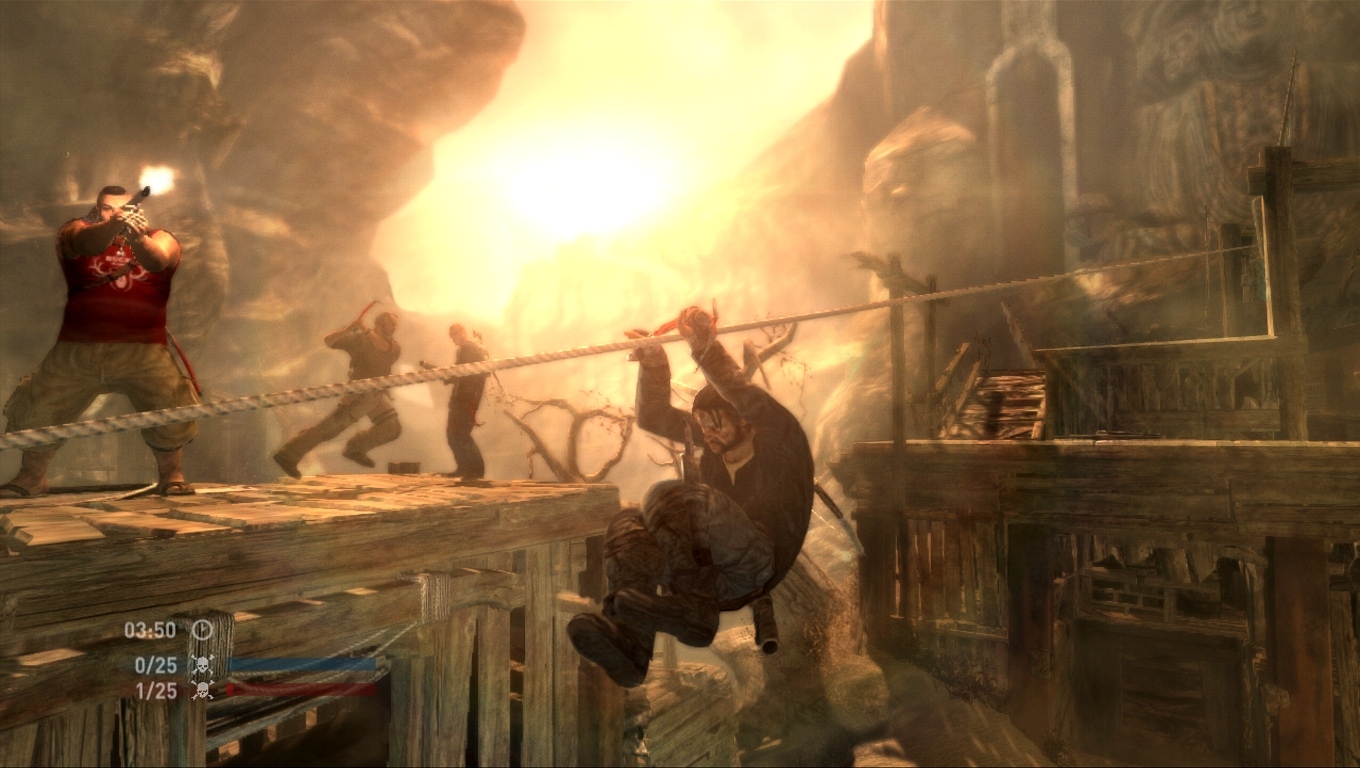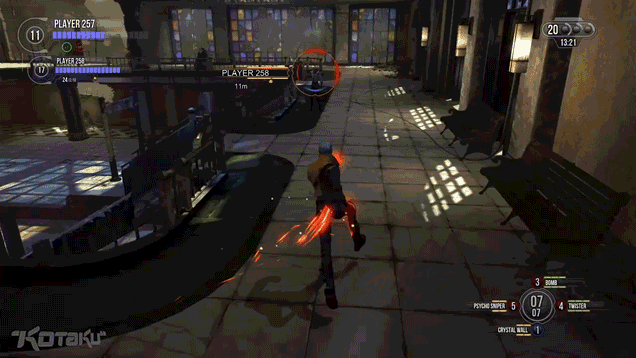Single-player. It is the original way we played games, and some would say it’s the only way.. Now everyone seems to fear its sudden and immediate demise. (Dun dun duuuuunn.) Is this death of solo gaming true? Or are gamers just overreacting (not that that ever happens)?
The short answer is no. The long answer is more complicated.
If you look at it from the solo-only “I don’t ever play online” perspective, there are certainly more games where multiplayer has been added. In none of those cases did the single-player die off or get diminished (in fact, often the opposite happened), but the shift is notable and sometimes had an impact on mechanics.
For instance, Dead Space 3‘s crafting system caused the series to drop its competitive multiplayer and instead be a co-op experience. Mass Effect 3 added new movement systems and a weight system to make it more active and fast-paced during combat. In other cases, the changes would appear in more surprising ways, such as Assassin’s Creed: Rogue utilizing ideas from the series’ multiplayer.

However, for some, the inclusion of multiplayer of any kind is seen as a downside. For instance, with the Tomb Raider 2013 reboot, all the downloadable content, save for one piece of DLC, was for the game’s multiplayer (and even then it was only map packs).
There was no new single-player content planned, so the lack of genuine tombs and puzzles never got addressed. Square Enix went double-down on the experimental half of the game, and when Eidos Montreal failed to deliver, it blew up in their face hard. To the point that apparently, instead of having a competent multiplayer team make the multiplayer as fun as it could be, they dropped it entirely for Rise of the Tomb Raider.
Yet, that’s not really the most constructive response either.
While fans were rightfully inflamed to complain about the ludicrous amounts of lag on console, and the terrible controls on PC, the inclusion of multiplayer was perfectly reasonable for Tomb Raider. Co-op even worked marvelously in Lara Croft and The Guardian of Light. If they’d more heavily emphasized the survival elements along with the traps and traversal mechanics, it would have been like The Last of Us‘ multiplayer 2.0.
Except we’ll probably never get that, because fans not open to the multiplayer complained endlessly at its very inclusion.

You see, that’s the other side of things.
Most multiplayer gamers didn’t blink an eye when Battlefield 3 had single-player. Even reviewers barely took note, and kept looking to the multiplayer. There was no serious harm or foul, just some people who were severely underwhelmed at DICE’s idea of a solo Battlefield experience.
You do not see this kind of “I’ll just keep playing what I like” attitude whenever a single-player game adds multiplayer. Even when you later find the detractors liking the multiplayer, such as with The Last of Us and Mass Effect 3, they go right back to their stubbornness afterward. Even critics have a habit of doing this, sounding almost astonished when The Last of Us‘ multiplayer didn’t somehow bore them to tears.
No matter what, they almost always use a predictable argument I’ve learned by heart now. Let’s address it, very briefly here.
- “Multiplayer takes away resources” — This is, nine times out of ten, completely false. If there isn’t a separate internal team to start with, there’s an additional developer brought on board. And if you try to say “that’s taking budget away”, then you seem to have forgotten that the publisher is paying extra to include multiplayer. Unless we’re talking about Microsoft and the Phantom Dust reboot, which is actually a case of demanding single-player in a multiplayer-only game. Also, don’t forget that too many cooks can spoil a dish (hello, Assassin’s Creed: Unity!)

- “They’ll water down the single-player” — Generally, multiplayer requires an intense understanding of the game’s mechanics. In fact, in the cases of Mass Effect 3 and Tomb Raider, multiplayer added new mechanics on top of the base ones. If it feels watered down, then that isn’t the multiplayer’s fault, but instead the developer going for wider audience appeal across the board.
- “No one wants [insert game] with multiplayer” — From a statistical standpoint, that is literally impossible. From a logical standpoint, you are generalizing and/or valuing your opinion over everyone else’s. For example, Dead Space 2 added multiplayer because fans wanted it; not that anyone seems to remember that little fact. Other cases include Bioshock 2, Batman: Arkham Origins, and Don’t Starve Togther. I’m afraid other people simply don’t have your amazing gaming tastes.
And now that we’ve got those clichéd arguments over with, back to the topic at hand!
There’s another angle to this, though. Addition of multiplayer is one thing, but there is growing concern that games are trying to remove any type of single-player mode entirely. The prime reasons for this are games like Titanfall, Evolve, Destiny, Diablo III, and fellow multiplayer-focused games – the argument being that, as multiplayer games continue to make the most money overall, publishers will keep pushing for online-only experiences. Right?
Not necessarily. Evolve and Diablo III can be played offline, and can also be counted alongside Destiny in having a modest (if not sizeable) amount of single-player content. Evolve has a full campaign mode with shifting variables, which still includes the game’s lengthy progression system and numerous playable characters. Diablo III may only be offline on consoles, but at least that is an option now after fan outcry.
Some games, like Destiny, are built to be played either alone or together with friends. You can even play Destiny on PlayStation 4 without PlayStation Plus. You just can’t party up with anyone, which clearly is not the concern of solo players. Still, it requires an internet connection, and that’s a big problem for some gamers.
So, does that mean in the future, we won’t be able to game without internet, even in single-player? Maybe… but maybe not.

The actual amount of games you can play offline has grown substantially. Between GOG.com and a number of franchises, there has actually been a growth in single-player games. And some games that used to have multiplayer are dropping it to focus on the single-player experience. Example: for the first time in franchise history, Wolfenstein: The New Order had no multiplayer. Dishonored also had no multiplayer. Neither did Deus Ex: Human Revolution. All were AAA first-person action games, the genre most frequently seen including multiplayer.
How did this madness occur? Well, there was a demand, publishers trusted their developers, and the games were made to fit that demand. Often we hear “the game industry is a business” used as an excuse, but we seem to forget that it also can be in our favor.
People wanted more solo games, so more solo games were greenlit. It’s also in a publisher’s best interest to not have every game be online-enabled, because that means fewer servers to pay for. Sure, they have more worry about used-game sales, but with digital copies being bought more often, that’s becoming less of a concern.

So in the grand scheme of things, are single-player games incredibly at risk? Not really, but there are some things publishers are far too slow with on the uptake when it comes to what we, as their audience, want from them. The same could be said for some gamers though, who are focusing solely on their personal preferences rather than the big picture. None of this happens in a vacuum, and it’s hard not to find a reason for most of the decisions and actions that have lead us here.
What do you think: is single-player doomed? Do you take a side in this argument? Or do you think everyone is missing something? Let us know in the comments below!










Published: Jun 5, 2015 03:19 pm